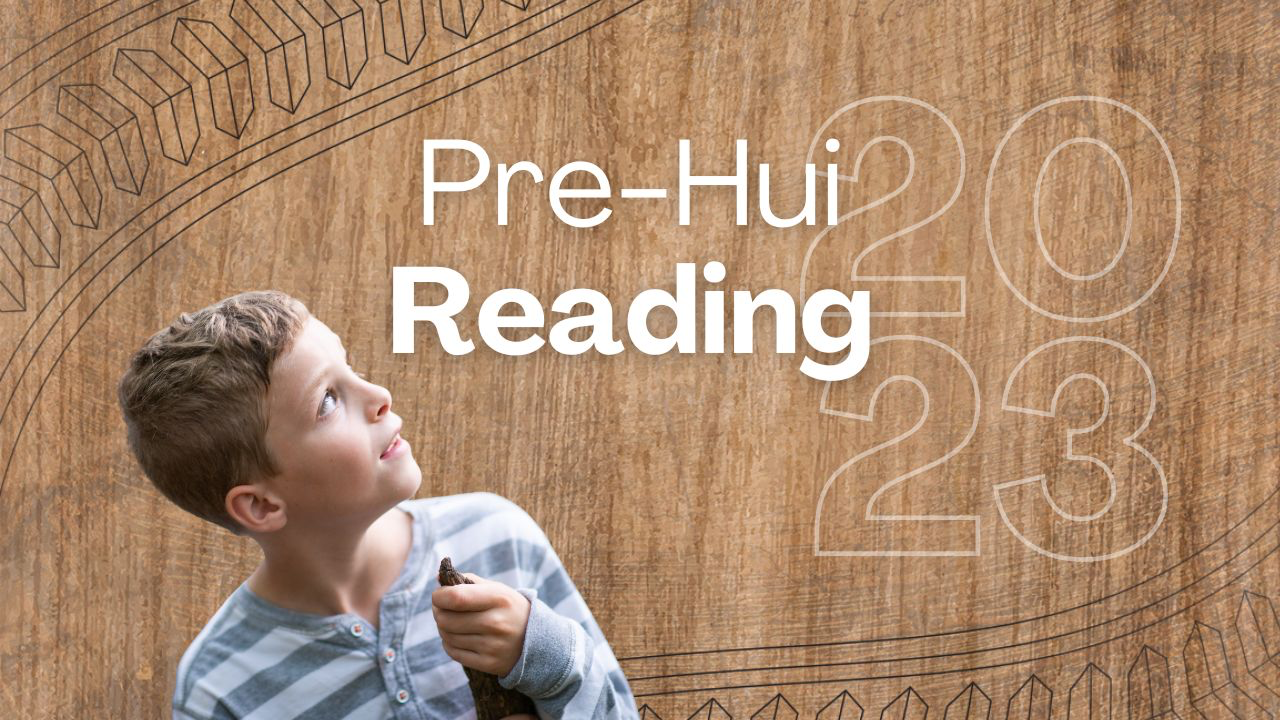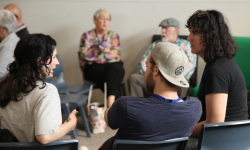
The most significant all-together gathering each year for Baptist churches in New Zealand is our annual National Hui (aka Assembly), this year being held at Manukau City Baptist Church, 2-3 November. Each local Baptist church around the motu can send delegates as their representatives as we worship God, celebrate, and engage together on issues to do with the life and work of the Baptist ‘tribe’ of Christians in Aotearoa New Zealand (aka the Baptist Union).
This year the Hui theme is Baptists shaping our future | ngau nui, ngau roa, hei ngao matariki. Whether it's the next steps on our treaty journey, our young people, the constitution that shapes us, our posture in engaging with difficult conversations, stewarding our assets, ensuring our people and places are safe, or determining our hand-carved mission… it’s time to take some big bites to ensure gospel renewal of people and places in Aotearoa and beyond. The main sessions at Hui have pre-reading to help Hui delegates get up to speed, as well as to keep the ‘Team of 40,000’ Baptists informed on what is happening on their behalf at Hui. Below is the pre-hui read for:
Big Bite 1: A posture of humility for difficult conversations
Christa McKirland is lecturer in Systematic Theology at Carey Baptist College, and member of Royal Oak Baptist Church.
This pre-reading is for the session about our posture for difficult conversations. While words can only do so much, perhaps they can remind us of a few things.
The first reminder is that we are family. But what makes us family? The grace of the Triune God. That God is Triune and that we need grace are first order doctrines, which are beliefs that maintain the gospel’s intelligibility and have been affirmed by the communion of saints throughout history [1].
By the Spirit, we are adopted into the Son’s relationship with the Father. We are children by grace, not doctrinal affirmations on nonessentials. We are not in the same family because we all agree on all things about how we live out the teachings of Jesus. We are in the same family because God has chosen creatures for fellowship. God is free to be any kind of God that God wants to be, and the incarnation reveals that God has chosen to be God for us and with us. This is not the choosing of a dictator or a capricious tyrant—but the choosing of a humble God. Biblical scholar, Karen Keen, recently published The Word of a Humble God, in which she states:
Humility is not the abandonment of one’s agency but the enactment of it. As a community practices humility together, it becomes a collaboration of wills. Significantly, no contradiction exists between an all-powerful, sovereign God and a humble one. Humility is not the renunciation of power; it’s the manner in which one uses personal agency. God uses power for self-giving love of others [2].
We see this in the opening chapter of Genesis in what some have called a “ministerial” mode of creation [3]. This mode allows us to identify the collaborative aspect of the created order in the creation process. In creation, God shares power with the other-than-human creation, saying, "Let the earth put forth vegetation". Instead of God being the one who makes the vegetation, now the earth acts ministerially (1:11). The repetition of "And it was so" shows it is still God's creating action, but through sharing power with the creation [4]. Beautifully, these verses reveal the nature of God’s authority and power through empowering creatures. Humans are later included in this ministry of caring for the created order (1:28). God does not need us to carry out God’s purposes, but God dignifies us with the choice to collaborate with God in bringing out divine purposes in the world.
As we engage in this session about our posture for difficult conversations, I believe it is important for us to remember that we serve a humble God and are served by a humble God. Part of that service is being grafted into God’s own family on no merit of our own, but by God’s grace in Christ. That does not mean there are no right and wrong answers to the difficult questions that are facing our communities today, however, our membership in that family is not determined by how we answer them. We remain siblings in Christ even if we disagree.
Perhaps we are more family in theory than in practice. But we are meant to be people of practice and that brings us to the second reminder.
As Baptists, we affirm that the Spirit of adoption into God’s family is not only a marker of identity, but it is our empowerment for action. The Humble God invites us to collaborate with God’s own purposes. This means a lot of listening. However, listening is its own underappreciated action. It is part of acting humbly. By another name—it is discernment.
We are meant to listen to the Spirit, especially together, and also to each other. The reason being: we are creatures—but not just any creatures! We are indwelt by the Spirit of the Son who singularly knows the mind of the Father and longs to share this mind with us. On issues of disagreement (even regarding Scriptural texts that we believe have already communicated the mind of God), we must be concerned with the rule of Christ in his church, not our own rule. In humility as gathered saints, we submit our will and our rule to the rule of Christ and doing his will. We are not a democracy but a Christocracy [5]. Thus, we listen because we do not have it all figured out and because by listening in the gathered community, we will hear the voice of the Humble God. This Humble God invites us to bring our human agency into collaboration with divine agency for the sake of the gospel in Aotearoa. What this will look like, especially in its specifics—we do not know.
What we need to know, we know with certainty. The Triune God of grace has brought us into the divine family and, in humility, has invited us to collaborate in the ministry of reconciliation in Aotearoa. This truth should transcend every disagreement and colour how we approach conflict on issues that do not undermine first order doctrines.
--------------------------------------------------------------------
We therefore invite delegates at this year’s National Hui to engage with the session we’re calling: ‘Big Bite 1: A posture of humility for difficult conversations’. Over the 100-minute slot on the Thursday, pastor Steve Worsley will unpack more around this topic. This will be followed by a panel discussion that will approach this from various angles (on the panel will be Christa McKirland, Steve Worsley, Peter Foster, and Tanya Lameta). There will then be conversation together with all Hui delegates. A potential outcome of this will be that delegates go back to their sending churches seeking this commitment:
Our faith community commits to staying in the room with an Eph 4:1-3 posture as we dialogue together on topics such as the Treaty, gender and sexuality, and climate change.
Let us pray together for the wisdom and guidance of God as we endeavour to continue the wonderful gospel heritage that we have.
--------------------------------------------------------------------
Hui Programme
The Hui programme is online here.
Other Pre-Hui Reads
A new way of making decisions together (pre-Hui read: Big Bite 2) by Peter Crow and Wayne Schache
A mechanism to ensure our people and places are safe (pre-Hui read: Big Bite 3) by Geraldine Crudge
An alignment of our assets for gospel renewal (pre-Hui read: Big Bite 4) by Charles Hewlett and Wayne Schache
A Baptist way to make decisions (pre-Hui read: Big Bites 1-4) by John Tucker
He Koronga Maatou – We have a dream (pre-Hui read: Baptist Māori) by Luke Kaa-Morgan
He Rito: The future of the church (pre-Hui read: Our young people) by Ethan Miller
The morning after (pre-Hui read – Arotahi) by Kelly Enright
Photo: Hui 2023 artwork
Footnotes
[1] For more on first, second, and third order doctrines, see Kevin J. Vanhoozer and Daniel J. Treier, Theology and the Mirror of Scripture: A Mere Evangelical Account (Downers Grove: IVP Academic, 2015), 125-126.
[2] Karen R. Keen, The Word of a Humble God: The Origins, Inspiration, and Interpretation of Scripture (Grand Rapids: Eerdmans, 2022), 133.
[3] Andrew Picard, Colin Gunton’s Trinitarian Theology of Culture: Towards a Living Sacrifice of Praise (London: T&T Clark, 2024), forthcoming.
[4] Picard, Colin Gunton’s Trinitarian Theology of Culture. Cf. Francis Watson, Text, Church and Word (Grand Rapids: Eerdmans, 1994), 142-143.
[5] John Tucker, “Baptist Disctinctives,” Baptist Churches of New Zealand, https://baptist.nz/baptist-distinctives/


